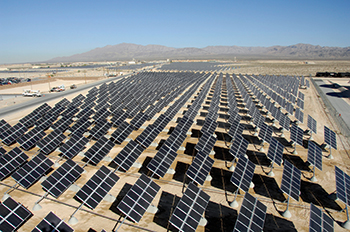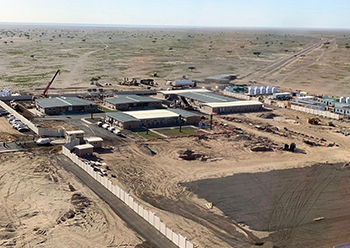
 A solar farm ... Saudi Arabia to roll out solar projects.
A solar farm ... Saudi Arabia to roll out solar projects.
The Renewable Energy Project Development Office (Repdo) of Saudi Arabia’s Ministry of Energy, Industry and Mineral Resources (MEIM) has issued request for proposals (RFPs) for Round Two of the kingdom’s National Renewable Energy Program (NREP).
Round Two projects have been divided into two categories: ‘Category A’ for smaller projects and ‘Category B’ for larger projects. ‘Category A’ projects require consortium members to partner with at least one local managing member.
The RFP for two ‘Category A’ projects was issued on August 1, following the issuance of RFP for four ‘Category B’ solar projects on July 18, a Saudi Press Agency report said.
The six Round Two projects will see a total solar photovoltaic (PV) capacity of 1.47 gigawatts (GW) tendered to qualified companies.
In June 2019, Repdo qualified 60 companies, including 28 from Saudi Arabia. Qualified companies will now proceed to the RFP stage as either managing member, technical member, or under a newly-created category of ‘local managing member’. This new category will encourage greater local and international partnerships during the forming of bidding consortiums.
Projects within Round Two will carry a minimum requirement of 17 per cent local content as calculated by the mechanisms defined by the Local Content & Government Procurement Authority (LCGPA), which aims to increase the value-added contribution of products and services in the national economy.
The six projects being tendered within Round Two represent the first half of Repdo’s 2019 project development pipeline. A further six projects will be tendered by the last quarter of the year and will constitute Round Three of the NREP.
Proposals for Round Two ‘Category B’ projects must be submitted by November 18, 2019, and the deadline for ‘Category A’ projects is December 3. Results of all bids will be live-streamed on Repdo’s eProcurement portal: www.powersaudiarabia.com.
All projects tendered by Repdo are 100 per cent independent power projects (IPPs) that will be backed by 20 to 25-year power purchase agreements.





















_0001.jpg)


.jpg)
















.jpg)








.jpg)





